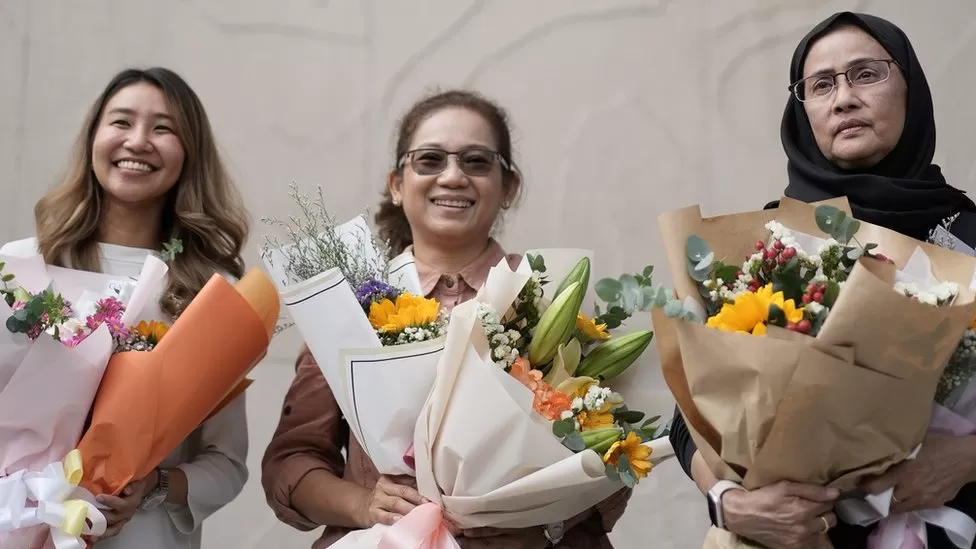Thai poultry farmer loses his 36th defamation suit

Chanchai Pheamphon accused the women of posting comments in support of others he sued.
At his chicken processing factories, migrant workers were allegedly abused.
The 37 cases Mr Pheamphon has filed have all been lost, a record for Thailand, where plaintiffs can sue for defamation quite easily.
His argument in court on Tuesday was that people reading the campaigners’ posts might be encouraged to watch a 107-second video made by a human rights group that he claimed defamed him. In less than 10 minutes, the judge reached his verdict. People would have to click on several links to find that video, he said. The defendants were not convicted on any grounds.
“I’m not happy with the verdict because I did nothing wrong from the beginning, and the plaintiff shouldn’t even have sued me,” said one of the defendants, Angkhana Neelapaijit.
She faced up to eight years in prison as a member of Thailand’s National Human Rights Commission. Along with Puttanee Kangkun and Thanaporn Saleelphol, she was cleared.
It took the court nearly four years to reach what appears to be an almost inevitable verdict following the defamation complaint. It has been a stressful and costly experience for the defendants. She has campaigned against injustices since her husband, Somchai, a human rights lawyer, was abducted and disappeared 19 years ago. The UN Working Group on Enforced or Involuntary Disappearances has appointed her.
Free speech has long been stifled by Thailand’s punitive defamation laws. According to some, they are a legal blood sport used by politicians and businesspeople, especially against journalists and activists who publish anything negative about them.
“It was a waste of four years,” Ms Angkhana said. “We’ve spent so much money on hiring lawyers or travelling costs. It’s been such a trauma, it affects my mental [health] and my work. This is something that cannot be measured. This particular case began in 2016 when 14 migrant workers in the Thammakaset chicken processing plant complained that they had been made to work excessively long hours and had their passports withheld. The Thai authorities upheld their complaint and ordered the company to pay the workers 1.7 million baht ($50,000) in compensation. But Mr Chanchai then started filing criminal charges – 37 of them, against 22 individuals, who had commented about the case.
The UN Human Rights Council said that companies, such as Thammakaset Company Limited, abuse the legal system to censor, intimidate, and silence criticism. Our deep concern is that human rights defenders are facing prison sentences and heavy fines for exercising their right to freedom of expression.
His epic litigation, which lasted seven years, was only an exercise of his right to defend his company’s reputation. All of his cases have been lost, except one, which was overturned on appeal.
Similarly, in 2013, a pineapple processing company in southern Thailand filed multiple criminal and civil charges against British labour activist Andy Hall over a report he helped research alleging that the company mistreated its workers.
For seven years, Mr Hall’s trials and appeals alternately found him guilty and not guilty, sometimes overturning these verdicts, eventually forcing the activist to leave Thailand because he said the endless court appearances were preventing him from working. Due to strict laws against criticizing the judiciary, legal experts are prevented from explaining publicly why this is so. Some have privately told the BBC that Thai judges are often young – you can become a judge at 25 – inexperienced and trained in too literal an interpretation of the law to dismiss even transparently opportunistic criminal complaints.
A Thai cultural norm that prioritizes protecting reputations over freedom of expression may also be at play.
The content I post online is now more careful. I usually keep my social media private, and even when I comment publicly, I am very cautious. Sutharee Wannasiri, another human rights campaigner, who won the case filed against her by Thammakaset in 2020, says she feels like she’s self-censoring.
Despite the company’s appeal last year, she won again. Since Thammakaset has taken the case to the Supreme Court, it may take another year before she is finally free of all legal proceedings.
“It’s really frustrating,” Sutharee says. We feel like our fundamental right to communicate human rights issues without fear of retaliation is being obstructed.
